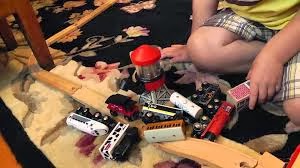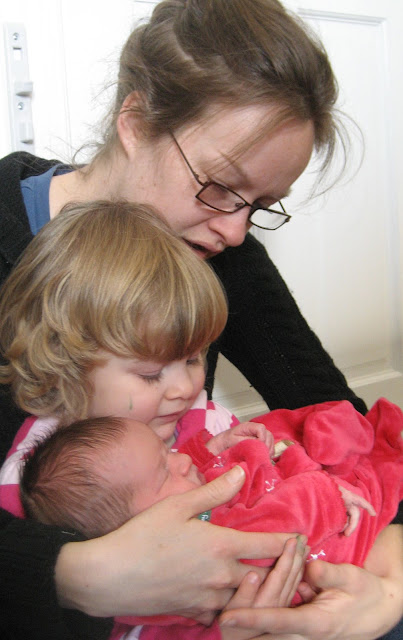On the Tenth Day: A Train Wreck
"When they passed out brains, you thought you
said 'trains' and missed yours" is a version of a middle school joke some of
my friends repeated incessantly in order to insult people.
Sometimes the word ‘brains’ was substituted for ‘looks’: “you thought they said
books and asked for a scary one" and so on. When it comes to tradition, someone
could easily apply that joke to me since I’ve never learned to do anything the
same way twice, but, unfortunately, there are no words that rhyme with tradition ("when they passed out tradition you thought they said ___": suggestions welcome).
Maybe my non-traditionalism has to do with the fact that my family never lived for more than three years in any one
place while I was growing. Whatever the reason for my inability to repeat, let’s
just say that a non-traditionalist has problems at Christmas.
My husband Paul grew up in a family that honored
tradition; they decorated the graves of parents and loved ones each Memorial
Day (and that, I hear, is what you are supposed
to do on Memorial Day) and vacationed in Ocean Grove, New Jersey every summer.
Each annual celebration called for specific foods: for birthdays Paul's
mom baked the cake from a recipe her mother had made to celebrate her birthday
when she was a child. They ate hot cross buns on each Good Friday, corn and
speedies* on July 4 and cider and donuts as soon as the apple press was in
operation in the fall. And when Christmas rolled around each year, you couldn't
even count the long-standing traditions the family practiced—a vast array of cut-out Christmas cookies
available throughout the season, Wimpies (aka Sloppy Joes) served on Christmas
Eve, and, king of all Christmas traditions, the village and working train set
beneath the tree. While the set was attractive to children, I learned early on that it was not really meant to be "played"
with--at least not in the way children like to play with things. Some of the
cardboard buildings were already antiques by the time I came into the family and the whole shebang was for
the most part an adult pastime. That’s because adults don't feel the need to move the people
once they are placed, and if someone accidentally knocks over a plastic
person or one of the buildings, they put it back where it belongs. If cars or the train derail, adults apologize and try to do better.
We inherited the train set when our kids were
small, and you’d better believe that the tradition changed when it
moved in with our family. It started out OK: sometime near the first half of
December, Paul would clean the platform and place the tree on it. He’d then
carefully and tenderly unpack the buildings, the trains, the cars and the
plastic people and arrange them on the platform. If you could possibly have
become a little plastic person and he had set you on that platform, you might have been convinced that you lived in a real live town--that is, until you came up to a
plastic person sized to a different scale (we have different sizes of people and buildings on our platform--one little detail for which some of us suspend our disbelief). Then you might think, depending
on whether you had become the big plastic person or the little plastic person,
that you had landed either in Jurassic Park or Gulliver's Lilliput. My point
here is that Paul’s was always a very nice, well planned town, and had you been a
plastic person, you could have lived happily there. His town was a very, very, very fine town.
The problem with it all began when Paul went to work on the
Monday after. Had he been the stay at home mom, I'm sure our kids would have waited for me, the father, to come
home before looking at or touching the set; that he would have kept them all day long in
the play pen or in another room in the house--whatever it took to create
as much daylight as possible between them and Trainville. I, however, was the stay-at-home Mom, and truly did try to encourage
Tim especially, barely two the first Christmas we had the set in our home, to
be careful, to be gentle, to leave the platform and amenities alone, to refrain from sitting on or throwing his ball at
the platform. But each and every day Paul would come home to Tim's desolation-- a collapsed greenhouse, derailed train and skewed buildings. Sometimes the cars sat wheel-less and later we'd find the tiny wheels beneath the living room rug. Other times all the
people went missing from their various stations on the platform, only to be
found stuffed into one of the boxcars. At the end of the day, nothing was ever where Paul had placed it.
And every evening was the same: Paul would come home from work, walk to the platform,
see what was left in the wake of Hurricane Tim (especially) or, at times, Kelle,
Kara and eventually Kyle. As I was getting dinner on the table, Paul was kneeling at the platform, still dressed in his winter coat and sometimes his hat, doing relief work and reconstruction. Even with his back to me, hat and coat still on, I could tell he wasn't happy.
There's no doubt in my mind that very (very) deep within his heart Paul's desire was for his children to enjoy the
train set as he had enjoyed it when he was a boy. His sense of order, however, was in
conflict with his children’s sense of play. It was my conflict as well as I, eight hours of each day of Advent, tried and failed to protect a tradition I
never understood.
Though our kids are grown and all living
elsewhere, this train tradition continues, by the way. Our grandchildren enjoy it now, but a few of them unfortunately have the same train-ethos as their forbears. The town is usually
in chaos.
*Speedies are sandwiches; chunks of marinated chicken, lamb or beef, wrapped in a slice of Roma bread. Traditional Binghamton food, of course. I like them.



Comments